|
Music Reviews
Alternative
Blues
Books
Christmas
Classic Rock
Country
Jazz
Lounge
Oldies
Power Pop
Punk & New Wave
Reggae
Rhythm & Blues
Seventies
Texas
Special Features
Randy's Rodeo
Sex Pistols
Motown
Halloween
Valentine's Day
Information
About Me
Feedback
Links
User's Guide
Support Me
Amazon
iTunes
Sheet Music Plus
|
Support Randy's Rodeo!  Shop at Amazon
for books and more...
Shop at Amazon
for books and more...
 Nearly
thirty years ago, Dave
Marsh became the first rock writer I read on a regular basis. Certainly, I admired his
writing and (usually) agreed with his critical opinions. Beyond that, though, I identified
with him in ways that were, in my still amorphous mind, ill-defined. I was a middle-class
kid from a conservative household, and my rebellion was just beginning to coalesce. Greil
Marcus frequently
flew over my head, and Lester Bangs seemed like he was from
another planet. Marsh, however - despite the fact that he could be brainy, radical, and outspoken
- was approachable, somehow normal in contrast to his whacked out peers. He had the aura
of a "regular Joe" rock
fan about him, and this helped him lead me to some of the music (much of it "regular
Joe" rock 'n' roll) I value to this day more than life itself. Nearly
thirty years ago, Dave
Marsh became the first rock writer I read on a regular basis. Certainly, I admired his
writing and (usually) agreed with his critical opinions. Beyond that, though, I identified
with him in ways that were, in my still amorphous mind, ill-defined. I was a middle-class
kid from a conservative household, and my rebellion was just beginning to coalesce. Greil
Marcus frequently
flew over my head, and Lester Bangs seemed like he was from
another planet. Marsh, however - despite the fact that he could be brainy, radical, and outspoken
- was approachable, somehow normal in contrast to his whacked out peers. He had the aura
of a "regular Joe" rock
fan about him, and this helped him lead me to some of the music (much of it "regular
Joe" rock 'n' roll) I value to this day more than life itself.
Dave Marsh's career as a journalist began at Creem magazine. He co-founded the
legendary rock rag after dropping out of Detroit's Wayne State University in 1969, and he
quickly became a champion of the Motor City's MC5 and Bob Seger (then a much less mainstream
artist) as well as the garage rock and soul music that had long inspired him. It was at Creem that,
if reports are to be believed, Marsh coined the phrase "punk rock" while reviewing
a performance by ? & The Mysterians.
After brief stints at Newsday and The Real Paper, Marsh went to Rolling
Stone, spending five years as an associate and contributing editor writing features,
columns, and reviews. Like so many of rock journalism's first graduating class (Bangs and
Marcus among them), this was where Marsh made his name.
With his distinctive, authoritative style blending plainspoken passion and irreverent humor,
Dave Marsh became what he remains today: a leading voice among rock critics, a prolific
author, an outspoken critic of the record industry, and an advocate for social change through
music. Apart from his many books, his later efforts have included founding the Rock & Roll Confidential (now
called the Rock & Rap Confidential) and
writing a longstanding column, American Grandstand, currently published online
at StarPolish.com. A lengthy, interesting
interview with Marsh by Scott Woods (circa 2000) is posted on RockCritics.com.
Marsh's first book, Born
to Run: The Bruce Springsteen Story (1979), made history
as the first best-selling rock book, and it set a new standard for rock biographies. No longer
would tabloid-style, teen-oriented filler be acceptable. Marsh's studied, intimate portrait
of a rock star as an American hero (while decried by some as slanted and subjective), was
unprecedented in the still young field, and it helped put both its author and its subject
on the map. From there, Marsh produced major works about rock giants like Elvis
Presley and The
Who; ephemeral
(yet entertaining) efforts such as The Book Of Rock Lists and Merry
Christmas Baby; and a landmark volume immodestly billed as "the world's lengthiest act of
rock criticism," The Heart of Rock and Soul: The 1001 Greatest Singles Ever Made.
In addition to these and others reviewed below, Marsh has written, edited, or contributed
to many books. These include:
Dave Marsh is also frequently tapped to write liner notes, a skill that earned him a
"Best Album Notes" Grammy award in 1992 for Aretha Franklin's boxed set, The
Queen of Soul: The Atlantic Recordings. Other notable contributions include The Who's Thirty
Years of Maximum R&B (1994), Elvis Presley's Walk
A Mile in My Shoes: The Essential 70's Masters (1995), Fit
To Be Tied: Great Hits by Joan Jett and the Blackhearts (1997), The
Best of Faces: Good Boys When They're Asleep (1999), and The
Very Best of Jackson Browne (2004).
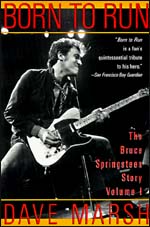 Born
To Run: The Bruce Springsteen Story Born
To Run: The Bruce Springsteen Story
by Dave
Marsh (1981, revised 1996)
The author would probably punch me in the face for saying so, but Dave Marsh is the Bruce Springsteen
of rock journalism. Egalitarian, passionate, and hard-working, Marsh brings his whole, open-minded
self to his subjects, and whether he loves or loathes their work-at-hand, he gives it a fair shot.
In his own words, he trusts his ears. This approach, together with his long-standing attraction to
working-class rock 'n' roll, made Marsh the ideal biographer for Bruce Springsteen. Not surprisingly, Born
To Run helped lift Springsteen to icon status as well as establish the nascent rock press as a
viable economic enterprise. Detractors have claimed that Marsh gets too close to his subjects, but
his willingness to do just that is what made Born
To Run such a thrilling read. Marsh is a fan first - albeit one who can be brutally honest when
necessary - and Bruce Springsteen in 1981 warranted just about every last syllable of Marsh's praise.
The Bruce Springsteen story up till that time was a fascinating parable of faith, adversity, and triumph
that said as much about the record industry and the human condition as it did about "The Boss."
With Glory
Days: Bruce Springsteen In The 80's (1987, revised 1996), criticisms of Marsh began to ring
true. His writing seemed rushed, and the sequel felt premature, but Springsteen's accomplishments of the
period (The River, Nebraska, Born
In The USA, Live 1975-1985) more than vindicated Marsh's earlier messianic pronouncements.
Say what you will about Marsh's relationship to Springsteen - Born
To Run is a landmark
book, and I think being "the Bruce Springsteen of rock journalism" is high praise, indeed.
Consumers Notes. Born
To Run is still available in mass
market paperback, but if you can search out the out-of-print 1996
revision, I
highly recommend doing so. Even better, in 2003 Marsh combined and revised both books as Two
Hearts: The Definitive Biography 1972-2003. Marsh's update was cursory - though I would argue
justifiably so, given Springsteen's fitful and overwrought output during the last two decades.
In 2005, Marsh oversaw Bruce
Springsteen On Tour: 1968-2005, a lavish pictorial with
entirely new text. [top of page]
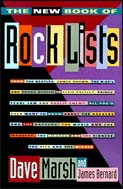 The
New Book Of Rock Lists The
New Book Of Rock Lists
by Dave
Marsh and James
Bernard (1994)
Truly, I come in praise of the first edition of The
Book Of Rock Lists (1981), written by Marsh and Kevin Stein. Not that there's anything wrong with
Marsh's later, all-new edition, but the first book was a constant companion of mine as I first began
to explore the world of rock - past, present, and future. It's binding now disintegrated, it served
as a roadmap for me as I expanded my record collection beyond the Top 40 pop and AOR rock that formed
the soundtrack of my adolescence. The next-to-last chapter, "Tops Of The Pops" (the authors'
favorite singles and albums, 1955-1980) became, with a little revision and plenty of additions, my "want
list" for
the next twenty years. The preceding chapters were nearly as useful and a lot more entertaining. From "Discredited
Rock Theories" (rock lyrics are poetry) to "Onan's Greatest Hits" (songs about masturbation)
to "David McGee Picks The Essential Christmas Albums" (the origin of my obsession with Christmas
music), it's a book made by rock fans for rock fans. The 1994 edition updates the concept ("10
Worst Things About MTV") and is just as much fun - and is much easier to track down. [top of page]
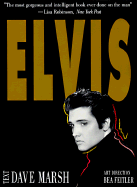 Elvis Elvis
by Dave
Marsh (1982, revised 1997)
Dave Marsh's next biography after his celebrated Bruce Springsteen tome was this tribute to Elvis
Presley - a logical step for any true believer in the power of rock 'n' roll. Surprisingly slim
on text, it was
nevertheless the definitive biography of "the King" until Peter
Guralnik's far more weighty examination more than ten years later, and the Marsh book is still the
first one I would recommend to any Elvis neophyte. Though many times more column space is devoted to
the gorgeous photographs (kudos to art director Bea Feitler) than Marsh's well-researched, thoughtful
telling, the net effect is a satisfying (if ultimately heartbreaking) portrait of an American legend
- just five years gone at the time. Released in the wake of Albert
Goldman's infamous, hateful, slanderous hack job, Marsh's Elvis was the first book to put
the scandalous excesses of Presley's later life and the senseless tragedy of his premature death into
proper perspective with his heroic past and his revolutionary music. (Revised in 1997 on the twentieth
anniversary of Presley's death.) [top of page]
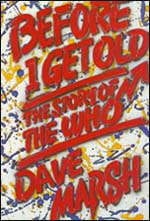 Before
I Get Old: The Story of the Who Before
I Get Old: The Story of the Who
by Dave
Marsh (1983)
Reading the reactions of Who fans to this book can be quite entertaining - Marsh
gets called things like "an
arrogant, snotty know-it-all" for simply telling the truth - e.g. Pete Townshend is not God -
or at least Marsh's version of it. The irony is, Marsh is a Who fan (a big one) but he possesses a
quality
rare among fanatics: objectivity. (One has to wonder, as well, if Marsh's firm, cold stance concerning
the Who had something to do with criticisms he had received for being too much the fan and not enough
the journalist.) The story of the Who has an arc, taking them from their hard scrabble days as tough,
loud Mods through the creative breakthrough of Tommy to their artistic fulfillment with Who's
Next - the making of which is an epic tale unto itself. But that arc (according to Marsh, and, for
what it's worth, I concur) ended abruptly when Keith Moon, the band's maniacal drummer, died somewhat
expectedly in 1978. The Who's subsequent albums were disappointing, and their endless cycle of farewell
and reunion tours (which were just beginning when Marsh published Before
I Get Old) has been
all but embarrassing. Nevertheless, the Who are arguably the greatest rock 'n' roll band ever, and
no one has yet come close to Dave Marsh in chronicling exactly why. [top of page]
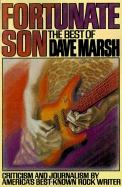 Fortunate
Son: The Best Of Dave Marsh Fortunate
Son: The Best Of Dave Marsh
by Dave
Marsh (1985)
This retrospective anthology takes Marsh from his days as a rockin' rollin' rabble rouser for Creem magazine
through his ascendancy to top of his profession as a biographer of the legends of rock 'n' roll. Along
the way, however, he kept writing like a dervish, for Rolling Stone, The Record, Musician,
and more. Never a shrinking violet, it's a gas to see how his faith in rock is challenged - by fallen
idols (Bob Seger) and a corrupt industry (MTV) - and yet survives and thrives, growing ever more radical
as he matures. Marsh's appeal is how, despite his keen wit, muscular intelligence, and healthy cynicism,
he still believes so resolutely that rock 'n' roll will stand. The desperate kid listening to the radio
under the covers is still there in Marsh's writing, still very much alive inside the author himself.
And that, if nothing else, makes him worth reading. [top of page]
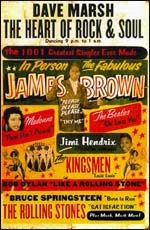 Heart
of Rock & Soul: The 1001 Greatest Singles Ever Made Heart
of Rock & Soul: The 1001 Greatest Singles Ever Made
by Dave
Marsh (1989, revised 1999)
It's no secret that record geeks love lists. Nick Hornby's book High
Fidelity (later a movie starring
John Cusack) forever immortalized this compulsive tendency - the endless compiling of "Top 10" lists
infected the protagonist's personal life nearly as much as his listening habits. And, what are rock
critics but professional record geeks? They do what we do - obsess about records like they hold some
sort of
secret to life (well, they do) - but they get paid for it. One hopes, then, that Dave Marsh got a hell
of a paycheck for this, the self-proclaimed "world's lengthiest act of rock criticism." Though
that boast was undoubtedly made tongue-in-cheek, Marsh tackles his subject with utter seriousness.
The single - then in its final days as a viable commercial format - represented to Marsh the ultimate
expression of rock 'n' roll music. Rock was, from its beginning, a product of the recording studio
and the radio
transmitter, and the best rock statements were made in three-and-a-half minutes on a seven-inch piece
of plastic - not spread across two or more sides of vinyl. This book is an unironic paean to the garage
bands, girl groups, heavy metal heroes, and soul men who built the foundation of what would eventually
become a bloated and segregated art form. To Marsh, rap, punk, and, well, Bruce Springsteen helped
save it from that ignoble fate, but it's no surprise that a large part of Marsh's list was released
before
1972. Nevertheless, The
Heart Of Rock & Soul is a monumental act of faith, and it's an
essential roadmap to record collecting. (By the way, someone has digitized Marsh's list and posted
it online.) [top of page]
 Merry
Christmas Baby: Holiday Music From Bing To Sting Merry
Christmas Baby: Holiday Music From Bing To Sting
by Dave
Marsh & Steve
Propes (1993)
Dave Marsh - especially as an editor or contributor - has been involved in some fairly slight literary
efforts. Possessed of a healthy grasp of the absurd, he's lent his name to some books that make you wonder
exactly who wanted to read them. Merry Christmas Baby is just such a book, and I am just such
a reader. Compared to most of Marsh's books, this isn't particularly well-written, nor is it as exhaustively
researched or well annotated. But, I love rock & soul Christmas
music (the
modern variety, at least), and this is the only book ever written about it (to my knowledge, anyway).
Marsh
and his coauthor (Steve Propes, author of several books about record collecting) run rapidly through
nearly 100 years of recorded history, from the Hayden Quartet's "Jingle Bells" (1902) to A
Very Special Christmas, an all-star effort from 1992 (which Propes and Marsh like way too
much, incidentally). The most useful features of the book are the lists, including "Christmas Every
Day," which concludes the book with the 365 greatest Christmas singles. Despite their inclusion
of Kenny Rogers (Kenny Rogers?!?), Marsh and Propes know their stuff, and you could do a lot worse than Merry
Christmas Baby when investigating this irresistible genre. [top of page]
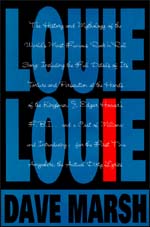 Louie
Louie Louie
Louie
by Dave
Marsh (1993)
Subtitled, "The History and Mythology of the World's Most Famous Rock 'n' Roll
Song; Including the Full Details of Its Torture and Persecution at the Hands of the
Kingsmen, J. Edgar Hoover's F.B.I., and a Cast of Millions; and Introducing, for
the First Time Anywhere, the Actual Dirty Lyrics," this
book really needs no further explanation. It will take most readers, in fact, nearly as long to read
the subtitle as it will to listen to the song! Suffice to say, Louie
Louie is the rock book
to read when you've read all the other rock books, but it's definitely a rock book you should read.
It captures well the reason why this one frivolous song has so enraptured the rock audience, and it
goes
a long way towards explaining why (or at least illustrating how) rock fans can be such an obsessed
bunch of kooks. In the process, Dave Marsh dissects the fascinating tale of "Louie Louie" from
its inception in the febrile mind of Richard Berry to its celebrated frat rock rendering by the Kingsmen
to the literally thousands of cover versions by everyone from the Sandpipers to Iggy Pop to Black Flag. [top of page]
|
|










